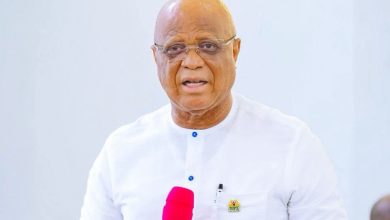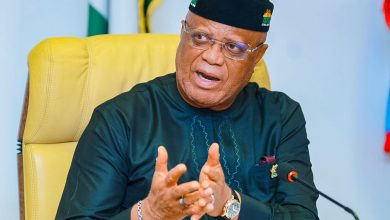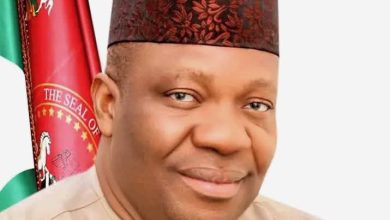
Nigeria’s seat of power is routinely mired in dumbfounding actions that stir unending public anxiety. From startling revelations of mind-blowing corruption to unthinkable cases of flagrant nepotism, avarice and religious predisposition, the story is the same.
Just when Nigerians would think that they have heard and seen enough of executive blunders, something more baffling surfaces. It is like what the all-time English literary legend, Williams Shakespeare, had enthused in his book, Macbeth: Act 1 Scene 2, “…So from that spring whence, comfort seemed to come discomfort swells.”
READ ALSO: Bizarre Politics of ‘Democomedy‘
That Nigeria could enter into a loan agreement with China with our hard-earned sovereignty put on the line is most odious and condemnable. The pains of losing Bakassi Peninsula to Cameroon following a judgment of International Court of Justice in The Hague in October 2002, which reportedly premised upon governmental slip-ups is yet to abate, only for another more damning steps that would strangulate our nationhood to be taken. It sounds gory!
Till date, the direct and aboriginal victims of that sad episode or Bakassi dilemma, Cross River and Akwa Ibom States indigenes, who were 90 per cent of the inhabitants, are still nursing the trauma of their dislocation. Why then could the Federal Government decide to engage in such misadventure over a loan deal, surreptitiously clad with loss of sovereignty in any event of default?
READ ALSO: Let’s Halt The Ominous Signs Of Despondency
Until the House of Representatives Committee on Treaties and Agreements decided recently to probe into the legality or otherwise of Chinese maltreatment of Nigerian citizens and their business transactions with us, it was never known that we were into a perfidious pit, except those who ‘contrived’ the loan.
The alarm on the deal came from the chairman of the House Committee, Mr Ossai Nicholas Ossai. According to him, the lethal clauses are contained in Article 8 (1) of the commercial loan agreement signed between Nigeria and Export-Import Bank of China. This involves a reported sum of $400 million in loans for the Nigeria National Information and Communication Technology (ICT) Infrastructure Backbone Phase II project signed in 2018.
The investigative hearing into some of the agreements signed between Nigeria and China had the presence of the minister of transport, Mr Rotimi Amaechi. He was quizzed variously on the ongoing modernisation of railway projects being implemented by the Federal Ministry of Transport.
The agreements in contention, which was signed by Federal Ministry of Finance (borrower) on behalf of Nigeria and the Export-Import Bank of China (lender) on September 5, 2018, reads: “The Borrower hereby irrevocably waives any immunity on the grounds of sovereign or otherwise for itself or its property in connection with any arbitration proceeding pursuant to Article 8(5), thereof with the enforcement of any arbitral award pursuant thereto, except for the military assets and diplomatic assets.”
Why was such a death trap laid against Nigeria, if indeed it is true? At the House Committee’s meeting, Ossai had stated further: “I have also seen from the Ministry of Communications where Nigeria signed off some certain level of its sovereignty if part of the clauses is breached. So, when the National Assembly reacts in this manner, to question some level of agreements being entered into by any ministry of this country with any other nation, we have every right to question that because anything that is going to happen will happen to our generations unborn. Whether we get it from China or not is immaterial.”
The China loan has remained intriguing. As it is, the agreements despite their delicate contents, have been signed without corresponding oversight inputs of the National Assembly. A bewildered Ossai had cried out to Amaechi, “You don’t have the details, clause by clause, in line with the Act that established DMO? We need to know those details even before going to sign such agreements. But those details are not provided to the parliament. So, we have the right to question them.”
It is urgent to know the details. The Nigerian public would equally be interested to know the details of such a seemingly daylight contraption. It is therefore quite in order for the House of Representatives Committee on Treaties and Agreements to summon Mrs Zainab Usman, minister of finance, budget and national planning; Dr Ali Isa Pantami, minister of communications and digital economy, and Ms Patience Oniha, director-general of Debt Management Office (DMO), to appear before it on August 17, 2020, with all relevant documents on the controversial agreements.
As Amaechi, the minister of transport was quoted while responding to queries, the sum of $500 million was the loan component borrowed from China while the balance of $349 million is the counterpart funding from Nigeria. A broader investigation on the various railway contract agreements signed between Nigeria and China (CCECC) on the modernisation of railway projects, construction of various railway lines including Abuja-Kaduna, Lagos-Ibadan and Lagos-Kano rail projects, will avail us a deeper insight into Nigeria and China’s contract deals.
However soothing the reaction of China on Monday, August 4, 2020, to the raging controversy may be, it has not taken away the fears of most Nigerians. In reacting, the Chinese Foreign Ministry denied that there was any clause in the loan contracts where Nigeria’ sovereignty was to be ceded to China.
The Asian country said in the statement, “We follow a “five-no” approach in our relations with Africa: no interference in African countries’ pursuit of development paths that fit their national conditions; no interference in African countries’ internal affairs; no imposition of our will on African countries; no attachment of political strings to assistance to Africa; and no seeking of selfish political gains in investment and financing cooperation with Africa.”
A revisit of our colonial struggle and the very remarkable labours of our heroes make it very felonious for any person or group of persons under any guise to joke with our sovereignty. It is suspicious when government affairs are conducted in a manner that breeds suspicion. This reflected in Ossai’s statement thus, “We have seen the agreement. We have also seen a clause where sovereignty is waived if we default. We have seen it in the document. It is here in the document where the sovereignty of our country is waived and we believe that the particular clause is not part of what they brought to the National Assembly to approve.”
How can there be two documents for one agreement? The National Assembly must make real its oversight powers by effectively rising to defend the corporate interest of Nigeria. Our seat of power must desist from provocative policies. Our sovereignty cannot be on sale. The latest loan scandal re-echoes the views of Brahma Chellaney, an Indian scholar, who coined the term, Debt-trap Diplomacy to describe “allegedly predatory Chinese lending practices where poor countries overwhelmed by unsustainable loans would be forced to cede control of strategic assets to Beijing.”
Currently, a dozen countries owe a debt of at least 20 per cent of their nominal Gross Domestic Product (GDP) to China. These are Djibouti, Tonga, Maldives, Republic of the Congo, Kyrgyzstan, Cambodia, Niger, Laos, Zambia, Samoa, Vanuatu, and Mongolia. Experts have accused Beijing of “luring developing or underdeveloped countries to borrow money for infrastructure projects and later controlling them if they fail to pay off their loans in time, while a US-based study says asset seizure is a rare instance.”
READ ALSO: Of Nigeria, EFCC And The Corruption Saga
In same wise, China’s economic goals in Africa and other parts of the world are described by experts as a “Trojan horse,” linking them with her multi-billion dollar Belt and Road Initiative (BRI) and reproving Beijing of using project assistance to lay ‘debt traps’ for benefiting countries. We pray this doesn’t happen.
Nigerians are becoming rather helpless as to what transpires in government. Conflicting news feeds on government policies and programmes fuel this apathy. This tendency will continue if what government says fails to match what is seen on the ground or experienced by the people.




